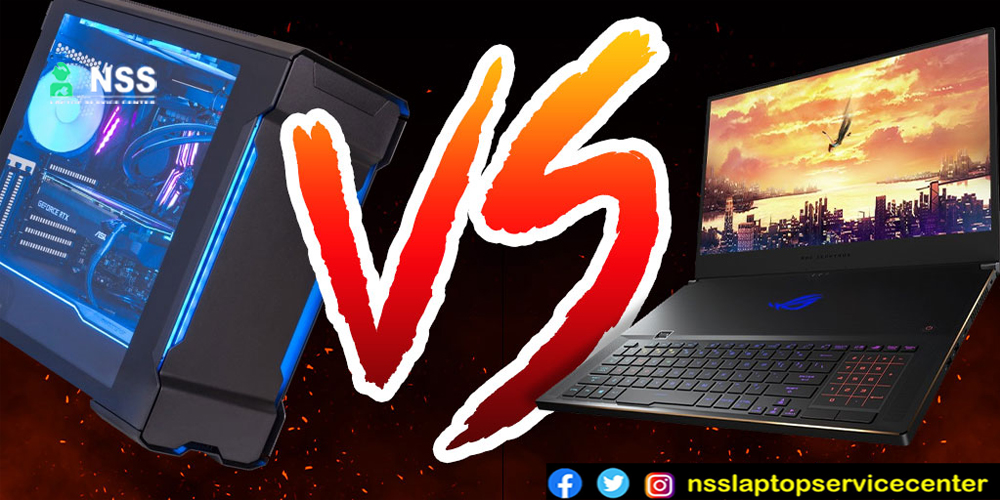
Desktop:
A desktop computer is a physical computing device with a display, CPU, keyboard, and mouse. It is a graphical user interface that runs on a software operating system. It is intended for routine usage in a single spot. Since it needs grid power, it is not transportable.
Laptop:
A laptop is a portable computer that can operate on energy or AC power for many hours. It is readily transportable. It is also known as a Notebook. It generally features an LED or LCD screen. It is portable because a battery or an alternating current supply may power it.

Distinguish between desktop and laptop.
-
Desktops and laptops are computer kinds; desktops are computer pioneers, while laptops are more minor and updated versions of desktops. Desktop computers are comparable to laptop computers but are not the same. Desktops and laptops are appropriate depending on the needs of the user.
-
Desktops require more room and time to install, but laptops are portable and do not require a set location.
-
Desktops have external components such as a monitor, UPS, CPU, or keyboard—On the other hand, laptops feature built-in elements such as a keyboard and a touchpad.
-
Desktops require complete installation before usage, but laptops are ready to use and do not require any manual installation.
-
Desktops have large storage capacities and replaceable hard drives, but laptops do not have large storage capacities and do not have irreparable hard drives.
-
Desktops do not require extensive maintenance or skill. However, laptops do require comprehensive care and experience.
Comparison between laptop and desktop
Processor
Despite being more powerful than laptop CPUs, desktop processors are slightly bigger. The newest CPUs are frequently available first in desktop computers on the market.
Although laptop CPUs are still restricted compared to desktop processors, they are pretty near. Gaming laptops, on the other hand, may match the performance of desktop PCs. However, these computers are relatively expensive.
Cost
Desktop computers are available at various prices, but the entry-level is relatively low. However, a broad range of component alternatives, such as desktops starting at $400 for a whole package that may still be a robust machine for customers, are available.
Laptops are also available on the market at various prices. However, they are more restricted than desktops. If you want to buy a powerful laptop with better graphics, faster speed, plenty of storage space, a faster CPU, an excellent display, and other features, it might cost up to $1500 or more, depending on the brand.
Storage on the inside
On desktop computers, several internal drives can be installed.
Laptop computers often have room for only one internal disc. If the extra internal storage is required, the drive must be changed.
Also Read: Connect Your TV to Your Laptop Wirelessly
Also Read: How to Stop a Laptop From Overheating?
External data storage
Desktop computers include data ports allowing users to connect to external devices such as USB, Thunderbolt, etc.
A laptop has fewer connections than a desktop computer but allows users to connect to several external discs.
Portability
Desktops require a primary power source and various pieces to be linked to form the Desktop unit; consequently, they are bulky, not portable, and generally sit in one spot. They are intended to be stationary and not moved frequently.
Laptops are tiny in size and may be easily moved anywhere. It has a built-in display (LED or LCD screen), touchpad (or trackball), and keyboard, making it incredibly small. As a result, they are highly portable. They are intended to be transported from one location to another and utilized on the go.
Assembly simplicity
To start a desktop computer, you must first connect all components, such as a monitor, CPU, keyboard, mouse, etc. It may also take some time and require extra room to set up. Although it has to be set up once and is not more complex, it is still more cumbersome than a laptop computer.
Laptops are meant to be simple and take minimal time to boot up. They run on batteries or alternating current. They are convenient to use when traveling as long as the battery is charged. Take it out of the box and push the power button (if the battery is charged); it will be ready to use in minutes.
Dimensions of the screen
The desktop monitor might be 19" or larger. As a result, screen sizes may be as large as a television, and a desktop computer may even be linked to a television.
The mobility of laptops is the most crucial characteristic; they also have LCD or LED displays but have tiny screen sizes, commonly ranging from 10" to 17". On the other hand, an external display may be linked to a laptop and can accommodate any size screen, monitor, or projector.
Keyboard
A desktop computer can be utilized with a full-size keyboard and number pad. There are no restrictions in this scenario.
A smaller keyboard can be found with a smaller laptop with 14" or 15" screens that do not include a number pad on the right side like a full-size keyboard. There are, however, 17-inch laptops with a larger keyboard and potentially a number pad available. However, these computers might be heavier.
Speed
Although laptops and desktops are becoming more comparable in speed and performance features, the desktop is regarded as more potent for hobbies such as gaming and video production.
Laptops are classified into various types. A gaming laptop can match the speed and performance of a desktop computer. However, it can be significantly more expensive than a Gaming Desktop. A typical notebook would do if you require the laptop for simple tasks like photo viewing and internet access.
Power Consumption
Desktop PCs use more power than laptop computers. It needs a high-wattage power source because it incorporates a monitor and several components. If you are working on a desktop computer and the power fluctuates or goes out, you may lose the document if you do not save it.
Laptop PCs require less electricity than desktop computers. Because it comprises few components, it requires less power. Power fluctuations are superior to desktop computers; they contain a battery, and thus, unsaved work will not be lost if the ability varies and goes out. When electricity changes or fails, the laptop battery automatically kicks in.

Gaming
High-powered video cards, which demand more power and require less heat, can be utilized in desktop computers. On a desktop, virtually any video card may be utilized, and two or more video cards can be used simultaneously. As a result, they provide improved game performance.
Because laptops have little physical space, their visual capabilities are constrained. Heat reduction in a laptop chassis is restricted by area, and higher-end laptops can perform better than typical CAD-based programs and visuals for gaming. They do not allow video cards that demand more watts to run since they have limited power.
Also Read: Best Gaming Laptops 2022
Upgrading
Desktops are easy to replace because the majority of the components are detachable. The desktop provides extra space for using tools, organizing wires, and adding and removing devices. As a result, desktop cases are more significant.
The only components that can be updated on a laptop are the RAM and hard disc. All other features are built-in and cannot be removed. Unlike desktop computers, laptops are not intended to function with updated features. Aside from the hard disc and RAM, every other part that must be upgraded will need a new laptop.
Repair
There is a variety of gear that must be connected externally to create a desktop unit. Users may purchase much of their hardware from any local computer retail outlet, making it easy to maintain the desktop computer.
Most consumers may find it difficult to open a laptop for repair. Furthermore, locating a replacement part usually entails contacting the computer manufacturer or buying from another online site.
Also Read: Are Macs Good For Gaming?
Also Read: Best Laptop Companies
Conclusion:
Ultimately, the final decision depends on the user's requirements and what they need. Desktop computers are the most outstanding overall solution if mobility is not an issue. If you require portability, though, a laptop is a better alternative. Choosing a computer for users for users can be confusing. There are some limitations to consider.
Frequently Asked Questions
Popular Services
- MacBook Battery Replacement Cost
- HP Printer Repair in Delhi NCR
- Dell Laptop Repair
- HP Laptop Repair
- Samsung Laptop Repair
- Lenovo Laptop Repair
- MacBook Repair
- Acer Laptop Repair
- Sony Vaio Laptop Repair
- Microsoft Surface Repair
- Asus Laptop Repair
- MSI Laptop Repair
- Fujitsu Laptop Repair
- Toshiba Laptop Repair
- HP Printer Repair Pune
- Microsoft Surface Battery Replacement
- Microsoft Surface Screen Replacement




